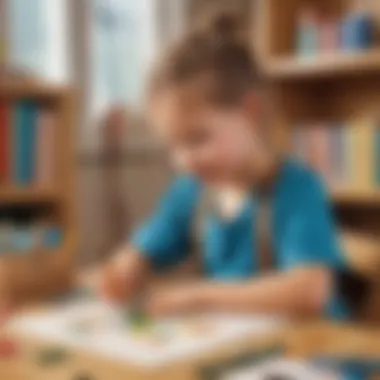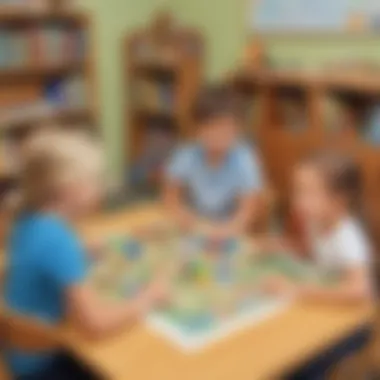Innovative Daycare Learning Activities to Foster Child Development


Fun Activities Ideas
When it comes to daycare learning activities for children, incorporating fun and engaging elements is key to promoting active participation and igniting curiosity. Indoor activities provide a safe environment for kids to explore and learn. From imaginative role-playing scenarios to hands-on sensory play stations, children can enhance their cognitive and social skills while having a blast. Outdoor adventures offer a breath of fresh air and a chance for kids to connect with nature. Nature walks, playground fun, and interactive scavenger hunts cultivate a sense of wonder and appreciation for the world around them.
Arts and crafts activities stimulate creativity and fine motor skills development. Painting, drawing, and crafting projects allow children to express themselves artistically and experiment with colors and textures. Science experiments bring the magic of discovery into the daycare setting. Simple experiments like making a volcano eruption or creating a rainbow in a jar not only entertain kids but also teach them important scientific concepts.
Cooking and baking activities not only tickle the taste buds but also teach valuable life skills. From measuring ingredients to following recipes, children can hone their math and reading skills while creating yummy treats. Through these diverse activities, children can explore, create, and learn in a fun and enriching environment.
Introduction to Daycare Learning Activities
In this compelling section, we delve into the fundamental aspects of daycare learning activities, offering a comprehensive guide for parents, caregivers, and educators. It is crucial to understand the significance of providing children with enriching experiences that foster their cognitive, emotional, and social development. The world of daycare learning activities is not merely about keeping children occupied; it is about creating a nurturing environment where young minds can explore, learn, and grow.
Importance of Engaging Learning Activities
Engaging learning activities play a pivotal role in the educational journey of children. By presenting information in an interactive and captivating manner, these activities spark curiosity, enhance retention, and encourage active participation. Children are naturally curious beings, and engaging activities cater to their innate desire to explore and experiment. Moreover, such activities promote creativity, problem-solving skills, and critical thinking, laying a strong foundation for lifelong learning.
Benefits of Interactive Play
Interactive play is more than just fun and games; it is a vital component of childhood development. Through interactive play, children learn essential social skills such as collaboration, communication, and conflict resolution. This type of play also aids in the development of fine and gross motor skills, promoting physical coordination and dexterity. Furthermore, interactive play fosters imagination and creativity, allowing children to express themselves freely and explore their unique interests and talents.
Craft-Based Activities
Craft-based activities play a crucial role in the holistic development of children, making them an essential component of this exploration of daycare learning activities. By engaging in hands-on creative projects, children not only enhance their artistic skills but also boost their cognitive abilities, fine motor skills, and creativity. Craft activities encourage self-expression, imagination, and problem-solving skills, fostering a well-rounded educational experience for young minds.
DIY Crafts for Creative Expression
DIY crafts, particularly Recycled Material Projects, are a standout feature in daycare learning activities. The emphasis on using recycled materials not only promotes sustainability but also teaches children the value of repurposing and creativity. These projects offer children the opportunity to think outside the box, exploring innovative ways to transform everyday items into new creations. The unique feature of Recycled Material Projects lies in their ability to spark imagination and environmental consciousness among children, making them a popular and beneficial choice for daycare activities.


Seasonal Craft Inspiration
Seasonal Craft Inspiration holds significance in daycare settings as it allows children to connect learning with the changing seasons. Crafting activities inspired by different seasons not only teach children about nature and the environment but also help them appreciate the beauty of seasonal changes. This thematic approach to crafts provides a fresh perspective for children, keeping them engaged and connected to the world around them. The unique feature of Seasonal Craft Inspiration is its ability to offer a diverse range of creative possibilities while instilling a sense of seasonal awareness and thematic learning in daycare programs.
Educational Games and Activities
Math and Logic Puzzles
Math and logic puzzles form a fundamental part of educational games and activities within daycare environments. These puzzles are tailored to challenge children's numerical reasoning and logical thinking skills in an entertaining way. Number recognition games, for instance, are well-regarded for their ability to improve children's ability to identify numbers quickly and accurately. By engaging in these games, children can strengthen their foundational math skills and develop a sharper numerical acumen. Pattern matching challenges, on the other hand, offer a stimulating way for children to enhance their pattern recognition abilities and logical reasoning. These challenges encourage children to identify relationships between shapes, colors, or objects, promoting cognitive flexibility and problem-solving strategies. Both types of puzzles contribute significantly to children's overall cognitive development, fostering a love for learning and intellectual growth.
Number Recognition Games
Number recognition games are specifically crafted to assist children in swiftly recognizing and understanding numerical symbols. These games help in honing children's ability to differentiate numbers, count accurately, and establish a strong foundation in mathematics. The key characteristic of number recognition games lies in their interactive nature, which makes learning numbers a dynamic and engaging experience for young children. Their popularity in daycare learning activities stems from their effectiveness in simplifying complex mathematical concepts into digestible and enjoyable exercises. Children benefit from the immediate feedback provided by these games, enhancing their comprehension and retention of numerical information. The unique feature of number recognition games lies in their adaptability to various skill levels, ensuring that children of different proficiency levels can participate and progress at their own pace.
Pattern Matching Challenges
Pattern matching challenges are designed to bolster children's pattern recognition abilities and critical thinking skills. These challenges involve identifying and extending visual patterns, promoting spatial awareness and logical reasoning. The key characteristic of pattern matching challenges is their capacity to enhance children's visual discrimination skills and promote cognitive flexibility. They are a popular choice for daycare learning activities due to their effectiveness in developing children's problem-solving aptitude in a visually appealing and engaging manner. The unique feature of pattern matching challenges is their versatility in presenting patterns of varying complexities, catering to children with different levels of cognitive development. While these challenges offer numerous cognitive benefits, they may require varying degrees of abstract thinking, which can pose challenges for some children within the daycare setting.
Language Development Activities
In the realm of educational games and activities, language development activities occupy a crucial position as they contribute significantly to children's linguistic proficiency and communication skills. These activities are tailored to enhance vocabulary, grammar, storytelling capabilities, and overall language comprehension in young learners. By integrating language development activities into daycare programs, children can (continue with rest of section as per detail instructions)
Physical and Outdoor Play
Physical and outdoor play are integral components in the daycare setting, offering children invaluable opportunities for holistic development. Engaging in outdoor activities not only promotes physical health but also enhances cognitive abilities, socio-emotional skills, and sensory experiences. Through active play outdoors, children develop gross motor skills, spatial awareness, and a deeper connection with the natural world. Additionally, outdoor play fosters creativity, imagination, and a sense of exploration in young minds.
Outdoor Exploration and Nature Activities


Nature Scavenger Hunts
Nature scavenger hunts are a popular and highly beneficial activity for young children in daycare settings. This activity involves searching for various natural items such as leaves, rocks, or flowers within a designated outdoor area. Nature scavenger hunts promote observation skills, critical thinking, and an appreciation for the environment among children. They encourage teamwork, communication, and problem-solving as participants work together to find and identify treasures from nature. Moreover, nature scavenger hunts instill a sense of wonder and curiosity about the world around them, creating memorable learning experiences.
Planting and Gardening Projects
Planting and gardening projects offer children hands-on experiences with nature, fostering a deep understanding of plant life cycles and the environment. Through planting seeds, watering plants, and caring for a garden, children learn responsibility, patience, and valuable lessons about growth and sustainability. Gardening projects also promote sensory development as children engage with soil, seeds, and plants, experiencing various textures, smells, and colors. Furthermore, gardening encourages a sense of accomplishment as children witness the fruits of their labor by watching plants grow and thrive. Overall, planting and gardening projects not only enhance physical development but also instill a sense of stewardship and connection to nature in young learners.
Music and Movement Sessions
Music and movement sessions play a pivotal role in daycare learning activities for children, offering a unique blend of auditory stimulation and physical engagement. These sessions are not just about grooving to tunes but serve as a holistic approach to enhancing children's development. By incorporating music and movement, children can improve their coordination, rhythm, and spatial awareness, making it a crucial component of early childhood education.
The benefits of music and movement sessions are multifaceted. Firstly, they promote creativity and self-expression, allowing children to explore different beats and rhythms while moving their bodies freely. This creative outlet aids in emotional development and encourages imagination. Additionally, these sessions support cognitive development by enhancing memory retention through song lyrics and rhythmic patterns. Furthermore, the physical aspect of movement helps in developing gross motor skills and coordination.
When implementing music and movement sessions in daycare activities, it's essential to consider the selection of age-appropriate music that is engaging and enriching. Incorporating a variety of music genres can expose children to diverse rhythms and melodies, broadening their musical experiences. Furthermore, providing a safe and spacious environment for movement activities is crucial to ensure children can freely express themselves without constraints.
Rhythm and Dance Activities
Rhythm and dance activities form a core component of music and movement sessions in daycare environments. These activities involve exploring various rhythmic patterns and movements that not only boost physical fitness but also foster creativity and self-confidence in children. Rhythm-based activities such as clapping to a beat, marching to different tempos, or dancing to different styles of music help children develop a sense of rhythm and coordination.
Engaging in dance activities not only promotes physical health but also instills discipline and focus in children. Following choreographed steps or creating their dance routines encourages children to pay attention to details, improving their concentration and memory skills. Moreover, dancing provides an avenue for self-expression, allowing children to convey emotions and feelings through movement.
Introducing rhythm and dance activities in daycare settings involves creating a conducive space for movement, with ample room for children to dance freely and explore various movements. Providing a mix of structured routines and free dance sessions caters to different learning styles and preferences, ensuring all children can participate and enjoy the activities.
Instrument Exploration
Instrument exploration adds a layer of sensory experience to music and movement sessions in daycare settings. Allowing children to interact with different instruments such as drums, shakers, xylophones, or simple percussion instruments not only exposes them to varied sounds but also enhances their auditory discrimination and fine motor skills.


Through instrument exploration, children can learn about cause and effect relationships, understanding how different actions produce specific sounds. This hands-on experience fosters curiosity and experimentation, boosting their problem-solving abilities and creativity. Moreover, exploring various instruments introduces children to the concept of teamwork and collaboration, especially when engaging in group musical activities.
When incorporating instrument exploration in daycare activities, it's important to provide age-appropriate instruments that are safe and easy to handle. Offering guided sessions where children can explore different instruments under supervision ensures a structured yet enjoyable learning experience. By encouraging children to create their musical sounds and rhythms, instrument exploration cultivates a deep appreciation for music and sound from a young age.
Sensory Play and Exploration
Sensory play and exploration are vital components of early childhood development, offering children valuable opportunities to engage their senses and enhance cognitive growth. In this article, we delve into the significance of sensory activities in fostering holistic learning experiences for young ones. By integrating sensory play into daycare settings, parents, caregivers, and educators can promote sensory awareness, fine motor skills, and emotional regulation in children. Sensory activities help children build neural connections, improve concentration, and develop self-regulation abilities, making them essential for comprehensive development.
Tactile Sensory Activities
Tactile sensory activities encompass a range of experiences that stimulate the sense of touch in children, leading to multifaceted developmental benefits. Sensory Bins and Playdough Fun stand out as popular choices for tactile sensory play due to their versatility and engaging nature. Sensory bins filled with various materials like rice, pasta, or beans provide tactile stimulation and promote sensory exploration. Playdough, with its malleable texture, encourages creativity, hand-eye coordination, and fine motor skills. The unique feature of these activities lies in their ability to enhance sensory perception while fostering imagination and problem-solving skills. Although messy at times, the benefits of sensory bins and playdough in promoting tactile sensory development far outweigh any cleanup efforts, making them worthwhile additions to daycare learning activities.
Textured Materials Exploration introduces children to a world of sensory experiences through different tactile surfaces and materials. Textured materials like sandpaper, cotton balls, or fabric scraps offer diverse sensations, encouraging tactile discrimination and sensory awareness. This hands-on exploration of textures not only enhances children's ability to distinguish between different tactile inputs but also supports language development as they describe the sensations encountered. The distinctive feature of textured materials exploration lies in its capacity to stimulate multiple senses simultaneously, providing a rich sensory environment for young learners. While these activities may require supervision to ensure safe exploration, the benefits of textured materials exploration in promoting sensory integration and cognitive development make them invaluable tools in daycare learning environments.
Visual and Auditory Sensory Experiences
Visual and auditory sensory experiences play a crucial role in engaging children's senses and facilitating perceptual development. By incorporating visually stimulating and auditory-rich activities into daycare routines, caregivers can enhance children's sensory processing and integration skills. Visual experiences such as watching colorful mobiles or exploring light panels can captivate children's attention, improve visual tracking abilities, and stimulate cognitive development. Auditory sensory activities like listening to music, nature sounds, or storytelling sessions can enhance auditory discrimination, language acquisition, and emotional expression in children. The interplay between visual and auditory sensory experiences offers children a well-rounded sensory curriculum that fosters sensory exploration, creativity, and self-expression in a playful yet educational manner.
Culinary and Cooking Adventures
In this article, Culinary and Cooking Adventures play a vital role in nurturing young minds and promoting holistic development. Engaging children in cooking activities not only enhances their creativity but also encourages them to explore new tastes and textures. Cooking experiences can be educational, helping children learn about nutrition, following instructions, and working together in a team. Providing children with opportunities to cook instills a sense of independence and boosts their self-esteem, making Culinary and Cooking Adventures an essential component in daycare learning activities.
Simple Cooking Projects for Kids
No-Bake Recipes
No-Bake Recipes are a fantastic addition to daycare learning activities due to their simplicity and safety for children. They allow kids to participate in the cooking process without using heat, making them suitable for various age groups. The key characteristic of No-Bake Recipes lies in their ease of preparation, requiring minimal supervision and equipment. This makes them a popular choice in daycare settings as they are time-efficient and encourage children to be more hands-on in the kitchen. Moreover, No-Bake Recipes spark creativity and experimentation, as kids can customize ingredients to suit their preferences. While No-Bake Recipes promote independence and decision-making skills, it is essential to note that some recipes may contain allergens, necessitating careful consideration and communication with parents.
Healthy Snack Creations
Healthy Snack Creations are instrumental in promoting nutritious eating habits among children. By incorporating fresh fruits, vegetables, and whole grains, these snacks not only provide essential nutrients but also serve as a fun way to introduce new foods to young ones. The key characteristic of Healthy Snack Creations lies in their ability to strike a balance between taste and health, appealing to children's palate while nourishing their bodies. These snacks are a popular choice for daycare learning activities as they encourage children to make mindful food choices and develop positive eating behaviors from a young age. Teaching children to prepare Healthy Snack Creations instills a sense of responsibility towards their well-being and empowers them to make informed dietary decisions. However, it is essential to highlight the importance of allergy awareness and dietary restrictions when introducing new ingredients to ensure a safe and inclusive culinary experience.
Food Exploration and Tasting
Food Exploration and Tasting sessions are enriching activities that stimulate children's senses and expand their culinary horizons. Through tasting various foods, children develop their palate, texture preferences, and cultural awareness. These activities foster curiosity and openness to trying new foods, contributing to a well-rounded appreciation for different cuisines. Additionally, Food Exploration and Tasting promote language development as children describe flavors, textures, and aromas they experience, enhancing their communication skills. Introducing children to diverse ingredients nurtures their adventurous spirit and encourages them to be more receptive to unfamiliar foods. However, it is imperative to consider individual preferences and dietary requirements when conducting Food Exploration and Tasting sessions to ensure a inclusive and enjoyable culinary exploration for all children.



